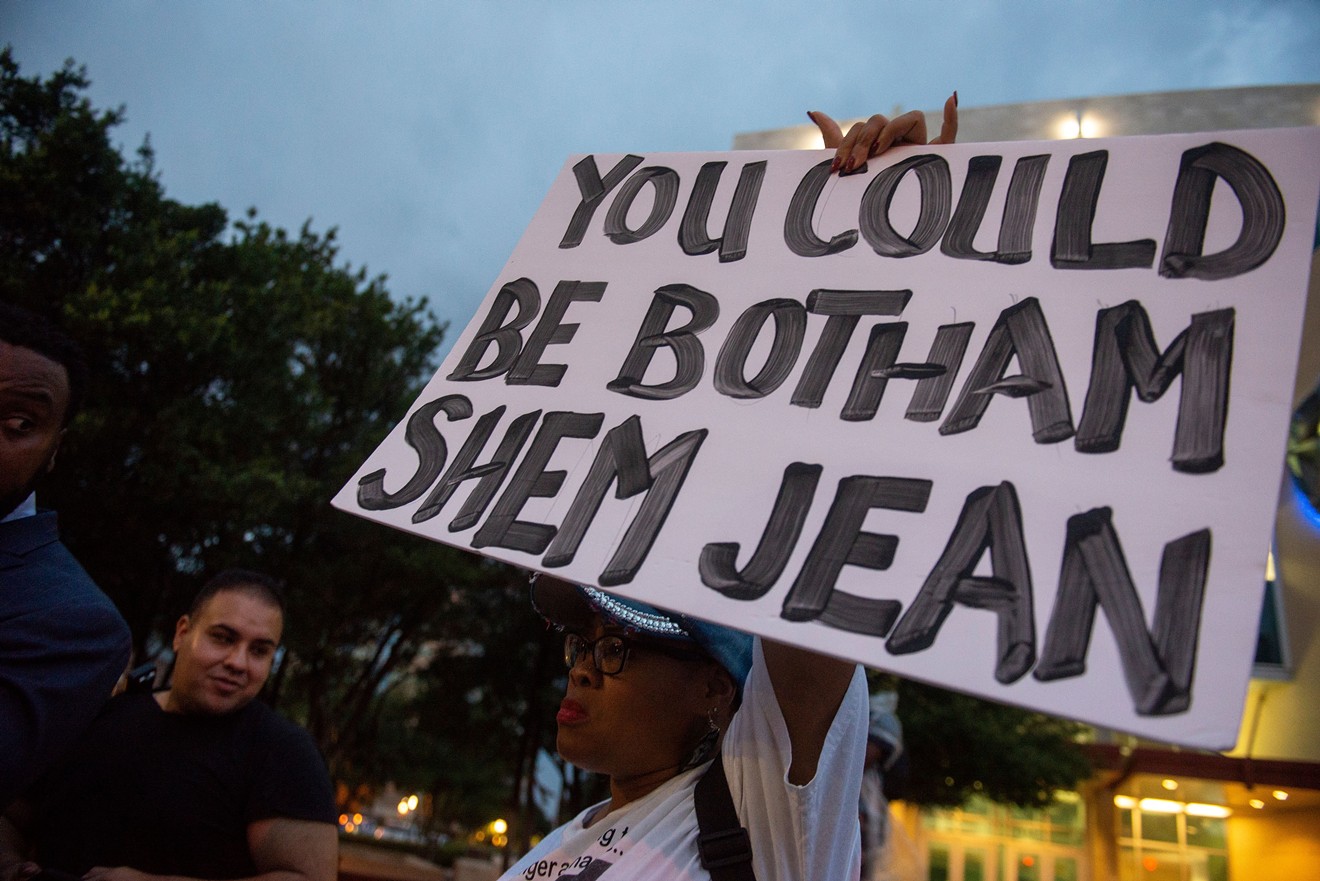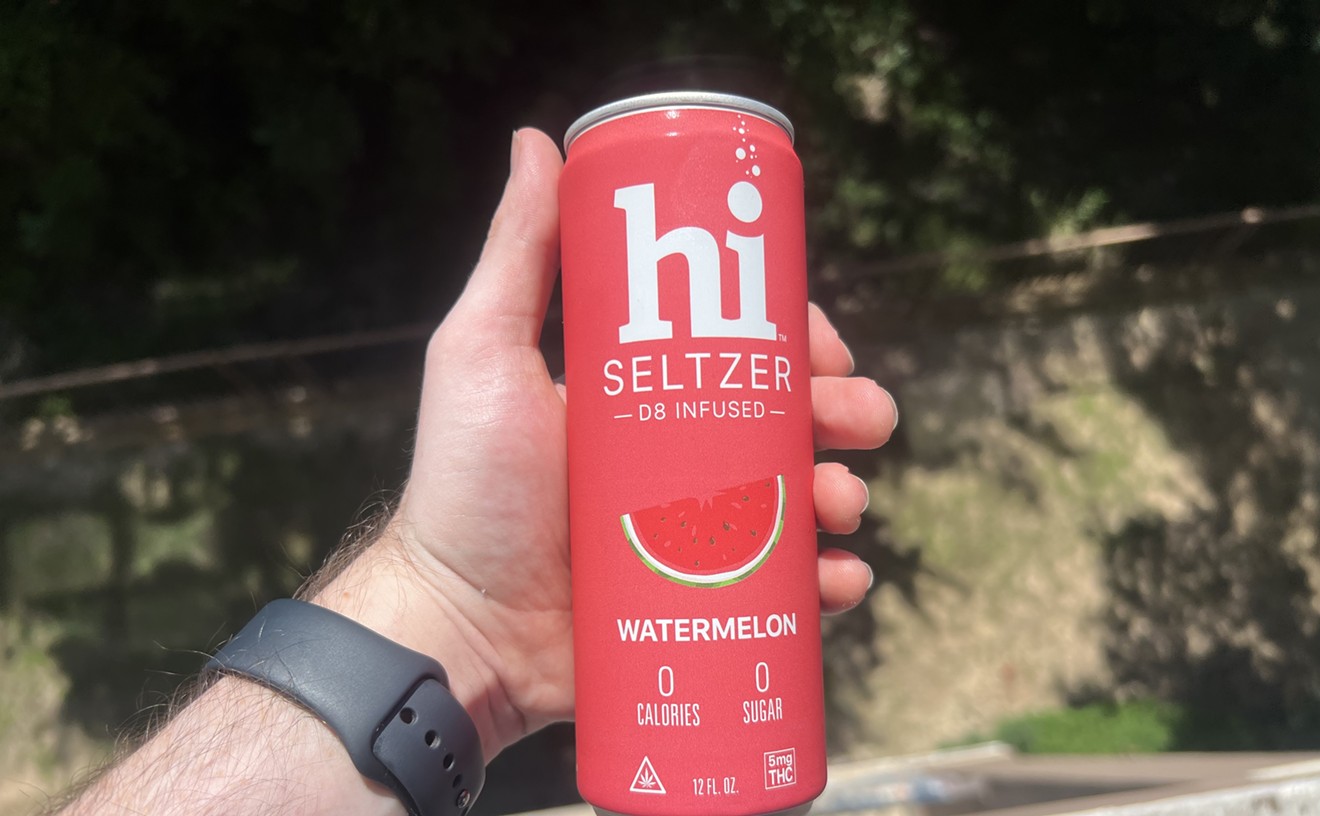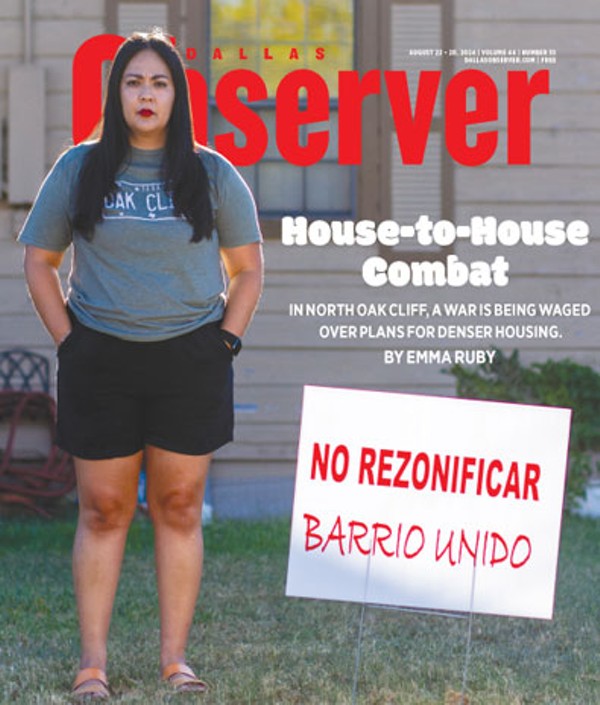“It is right for Hall to expect better from her officers than the use of deadly force under such circumstances and to terminate an officer who fails to meet her expectations in such circumstances,” the paper said.
In a news story in the same edition of the paper, a respected leader and commentator on civil rights issues in Dallas talked about a mapping project to show the locations of historical human rights atrocities in the city. Referring to the recent shooting death, he said, “And now the Botham Jean killing. That will need to be added.”If Amber Guyger fired her weapon under circumstances and for reasons that would have caused her to shoot at a white person in the same place and time, then this was not a human rights atrocity.
tweet this
Yes. Unless it was an accident.
Before Hall fired Officer Amber Guyger, who is white, some protesters and writers called Guyger a murderer. They drew a hard line linking the death of Botham Jean, who was black, to an entire recent bloody history of shootings of African-Americans by white cops. That’s completely legitimate and needs to be said. Unless it was an accident.
If it was an accident, it wasn’t murder. It was still a terrible accident with almost immeasurable repercussions. Jennifer Emily of The Dallas Morning News traveled to Jean’s hometown of Castries on the island of St. Lucia in the Caribbean to cover Jean’s funeral. Emily sent back a moving portrait of an entire nation deep in mourning over the needless death of a fine young man.
If it was an accident, that doesn’t mean it was not a crime. If I get drunk and kill somebody on the road, I may not have done it on purpose, but I may still have a serious responsibility for it. That responsibility may add up to some degree of criminal culpability, and that culpability may put me in prison. But I didn’t commit murder.
The distinction between accident and deliberate murder here is especially important, night and day. It’s opposite sides of the coin the moment we link the death of Botham Jean to the death six years ago of 17-year-old Trayvon Martin in Florida or the death of 50-year-old Walter Lamar Scott in North Charleston, South Carolina, three years ago or any other of the sickening procession of black people shot in which race clearly was a factor.
Race was not a factor in Jean's death if his death was an accident. If Guyger fired her weapon under circumstances and for reasons that would have caused her to shoot at a white person in the same place and time, then this was not a human rights atrocity.
For this to be a racial atrocity, did Guyger have to shoot Jean on purpose because he was black? That wouldn’t be my own only standard. I could see it as murder for way less explicit a reason than that.
White people are too afraid of black people. Superstitious fears based on racism can influence the most common interactions — just getting on an elevator — and that same fear certainly can and does affect white cops who suffer from it. When a white police officer says he shot a black person because he feared for his life, we need to know if that same cop also fears for his life when he gets stuck on the elevator with a black certified public accountant.
Don’t dismiss that. Some racist white people can have the racial heebie-jeebies all day long. In that case, their fear is not an excuse. It’s the problem.
But we know none of that about Guyger, and none of it may be true. In this day and age, lots of white people have grown beyond that stuff, especially people who are out in the real world all day. Simple social proximity tends to knock the ethnic corners off even the people who come from the most narrow white backgrounds. Mixing it up is good for the soul.
The mechanism by which we work our way in toward the truth on all these issues is not going to be, I hate to tell you, journalism, nor will it be politics, nor will it be social activism. The truth-finding system we have spent about a thousand years developing is called the law. The courts. That’s where this gets done.
It’s absolutely possible that a jury will look at all of the facts in this case and all of the arguments and then get together back in that room and decide against Guyger. They may say Jean’s death was less likely to have occurred had he been white. Then we wind up with something many of us would consider to be part of a kind of social mass murder, a repetitive pattern of killing that proceeds from racism.
But maybe not. The same jury might weigh all of the facts and testimony, all of the arguments and the law, and come to the conclusion that Botham Jean’s death was an awful and heart-rending accident. Period.
Think about what that would mean. If Jean’s death was an accident, not a murder, then think what a very serious mistake it would be to put it on the same map with the 1910 lynching of Allen Brooks in downtown Dallas or the 1973 murder — ruled murder by a jury — of 12-year-old Santos Rodriguez by a white Dallas cop. The gravity and significance of those terrible racist murders would be ill-served by lumping them together with a death that isn’t of the same order, that doesn’t fit the moral or legal pattern.
I understand exactly why so many people assume it does fit. Jean was in the sanctuary of his own home, his own castle, disturbing no one. If he’s not safe there, where is he safe?
Guyger says she went to the door of his apartment by mistake, thinking it was her own home. Even if that’s true, she had no more right to enter his home without his permission than a common burglar would have. She wasn’t investigating a complaint. Even when she saw him, she could have backed off. There was no law that said she had to shoot.
But none of that gets us to an intentional act. If she shot Jean with criminal intent, I haven’t yet heard a good theory for the intention. I assume we can all agree she wasn’t going door to door in her own building to shoot black people. If there was an intention and it had to do with race, then the intention had to occur after the door was opened and in the moments when she saw Jean inside.
If she’s telling the truth, if she thought Jean was an intruder in her own apartment, then what would have had to occur for her to develop an intention to murder him and for that intention to have had a basis in racism? She would have to have thought something like: This guy is in my apartment; he’s a burglar; he’s not doing what I’m telling him to do; maybe he’s going for a gun or something; if he were a white guy I’d back off, but he’s black, so I’m extra afraid, so I’ll shoot him.
Could it have gone like that? Sure. But we have no idea if it did or did not go that way. She could just as easily have thought, “Guy in my apartment, coming at me, got my gun out, can’t let him get my gun.”
Bang. A terrible, terrible accident.
The insistence of some critics of the police department is that Guyger did what she did because she is a white cop and he was a black man. But the only thing the critics know is that she is a white cop and he was a black man. None of the necessary connective tissue is there to make the case for murder. Not yet. Not now.
So let’s go back to the top and think about that Morning News editorial praising the police chief for firing Guyger before any formal or judicial finding in the case. The News starts off, “It is right for Hall to expect better from her officers than the use of deadly force under such circumstances.”
We don’t know what those circumstances were. We may know what we think they were, but we aren’t even close to the level of detail and understanding required to determine if Jean’s death was a murder or an accident.
The headline over the editorial was, “Sometimes leadership is firing a cop who shouldn’t have used deadly force.” But sometimes it’s not? Why this time? The editorial never addresses any of those questions.
I think we can read through that. Sometimes it’s right politically, the newspaper is saying, because the paper wants to tamp down the anger and unrest in the community.
But then the paper tries to have it both ways, thumping the desk with one hand and waggling a stern editorial finger over its head with the other: “In this highly charged moment,” the editorial intones, “only preserving the presumption of innocence for Guyger can create the space that justice requires. She is entitled to the right to appeal her firing. And she is entitled to a full and fair trial on the charge of manslaughter that she faces.”
So explain to me how this works. The “presumption of innocence for Guyger” goes away on the day she gets fired, but it comes back into play later on somehow when she appeals her firing? Who is doing the presuming here?But think about this. If it was an accident, then we should pay some grief to Guyger, too, because her own life has been terribly injured by something she did not mean to do.
tweet this
Sounds to me like, “We’re not presuming any innocence for her right now, because we want things to quiet down out on the street. But later on, when it’s off our own plate and on somebody else’s, then we will sternly admonish that somebody to presume her innocence until proven guilty.”
This is an awful case, and I understand why it has the community kind of tied up in a moral pretzel. We all feel a bottomless grief for Botham Jean, for his loved ones and for all who knew and loved this man.
But think about this: If it was an accident, then we should pay some grief to Guyger, too, because her own life has been terribly injured by something she did not mean to do.
We do not know yet which it is. Insisting that we do know when we don’t know is not a path to justice. Down that path lies more injustice, more mistrust, more hatred.















